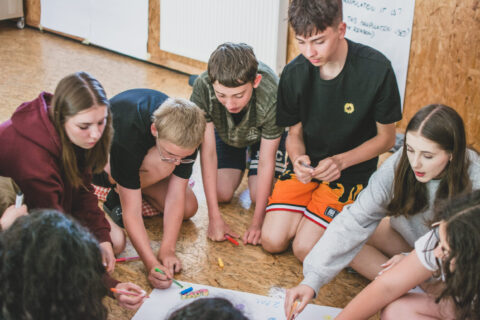Formally About Non-Formal Education: How We Educate at Brno For You
Just like formal education, which we know from school classrooms, non-formal education also follows clearly defined goals that we strive to achieve. Reaching these goals requires a structured plan and step-by-step approach, which we adapt based on the needs and capabilities of our participants.
The process of achieving our predetermined goals is flexible—it depends not only on the trainer but also on the group and each individual. Everyone shares responsibility for their own learning outcomes and the competencies they develop.
Participants in our projects are our partners, voluntarily engaging in activities. They step out of their comfort zones only when they feel safe. Mistakes are not punished here—on the contrary, we learn from them.

You learn by yourself, you learn in a group, and you learn from others. You learn based on your own needs—what truly interests you.
The environment in which learning takes place varies. A creative space that supports the learning process can be found in the heart of a city or in an open field. Here, you might not acquire a wealth of new theoretical knowledge, but through intuitive learning and hands-on experience, you will develop competencies—new skills and abilities for life that help you navigate an ever-changing world. We focus on developing personal attitudes, values, and emotions.
Just as a school diploma serves as proof of formal education, the European Youthpass certificate, which participants take home after an international camp, serves as proof of their non-formal learning experience within the Erasmus+ program.
Differences between formal and non-formal education
| Formal | Non-Formal | |
| Goal | Clearly defined | Clearly defined, co-created with participants |
| Plan | Clear, step-by-step approach | Step-by-step approach, adapted to participants’ needs |
| Process | Fixed | Flexible, based on group dynamics |
| Space | Fixed (classroom) | Variable (room, meadow, forest – depending on activity) |
| Learning | Conscious | Subconscious, intuitive |
| Type of learning | Information, knowledge | Competencies (knowledge, skills, values) |
| Mistakes | Punished (grading) | Welcomed, we learn from mistakes |
| Focus on work with | Individual and knowledge | Individual and group, knowledge, skills, attitudes, emotions |
| Responsibility | Educator | Individual, group, and educator |
| Role of the Group | Not very important | The group supports the learning process |
| Group Interaction | Competitiveness | Cooperation |
| Participation | Mandatory | Voluntary |
| Activity Leader | Authority, fixed leader | Partner, leader, leadership can rotate |
| Evaluation & Credit | Certificate/diploma from the activity leader | Self-assessment, certificate, proof of participation |
Through our activities, we enable young people to become creators of their own lives and active citizens—carriers of solidarity and positive change for communities across Europe. We do not strive for groundbreaking discoveries; instead, we believe in what we see working and draw inspiration from EU values.
The most important values can be found in the European Youth Strategy (2019–2027):
Engage
Supporting youth participation in democratic life.
Connect
Bringing young people together within and beyond the EU to promote volunteering, educational mobility, solidarity, and intercultural understanding.
Empower
Strengthening youth empowerment through quality, innovation, and recognition of youth work.






